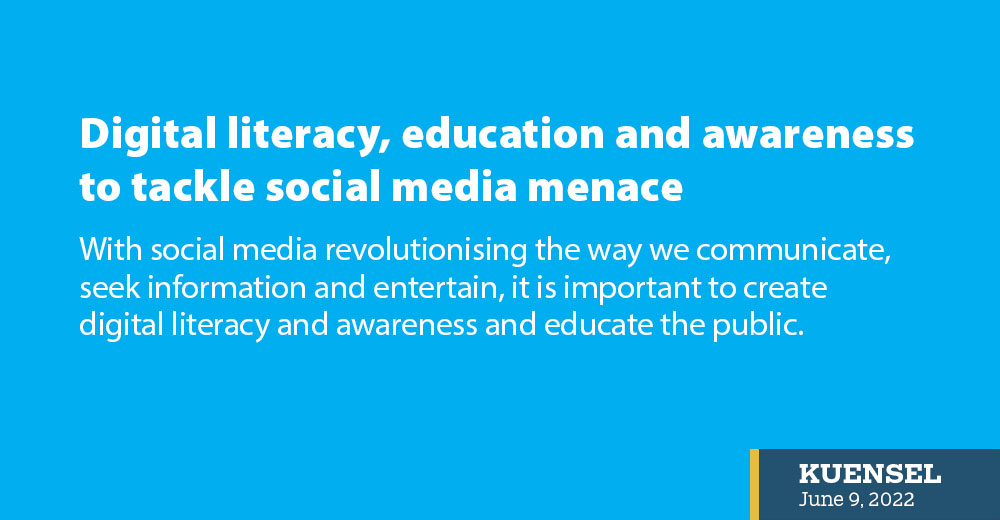Tashi Dema
With social media revolutionising the way we communicate, seek information and entertain, it is important to create digital literacy and awareness and educate the public.
A webinar conducted on June 7 titled ‘Impact of Social Media in Modern Bhutan’, was aimed to create a digital Bhutan harmonising all aspects of public service delivery and digitally empowering citizens.
Although internet was launched only in 1999 in the country, it has penetrated almost all nooks and corners of the country facilitating the use of social media.
A study conducted by Bhutan Media Foundation in 2020 showed 90 percent of Bhutanese people are on social media, spending 163 minutes on average daily.
Of the social media platforms, Facebook is the most widely used platform.
The study also found that most people are on social media to seek information and entertain themselves. Many users, however, shared their negative experience of social media was indecent posts.
Moderated by the executive director of Bhutan Media Foundation, Needrup Zangpo, the webinar discussed the boon and bane of social media, where it was highlighted that although social media has resulted in negative content, anonymous users, gossip, biased opinions and one-sided stories since the first parliamentary democratic elections in 2008, social media benefitted the Bhutanese society.
A technology strategist and consultant, Tshering Cijay Dorji (PhD), said social media helped to promote democratic culture, provide opportunity for every citizen to raise their voice and also bring dialogues between the electorate and the elected.
He cited the example of people who are wise, but without formal education, use Wechat to discuss issues with their elected representatives.
He, however, said it is important to educate the public on how to deduce the social media content and to personally use social media responsibly.
The press secretary of the Prime Minister, Kesang Dema, said they use social media to inform people major decisions the government makes or developments, to share Prime Minister’s thoughts on pertinent topics, engage public on important matters, and explain to people why the government is doing what it is doing.
“The idea is to connect to as many people as possible at the shortest time and social media offers that kind of reach and coverage,” she said.
Kesang Dema said the government’s social media policy framed in 2016 sets a basic standard to use social media.
The chief executive officer of Nyingnor, a company with a team of digital problem solvers, Phub Dorji, emphasised the need for traditional media houses to provide insightful information by conducting research and giving the proper context of the social media content.
“The role of traditional media is still important and relevant in this age of social media,” he said. “Mainstream media cannot just repost what government agencies post. They cannot reproduce what government agencies put, but have well-researched articles.”
Phub Dorji also highlighted the need for traditional media to pace up with technological change. “Traditional media houses have a role to fight disinformation on social media.”
He said social media has many positive impacts on Bhutanese youth as many learnt digital skills online and helped many to stay engaged.
Organised by a German political foundation that promotes liberal values, Friedrich Naumann Foundation for Freedom, the panellists agreed that as we progress as a community, society, and nation, it is must to promote positive social media content.
Meanwhile, the president of the German-Bhutan Himalaya Society, Reinhard Wolf, said social media is helping people stay connected in the rugged terrain.
He said it is necessary to have curriculums in schools that teach children to make wise use of social media and confront them with fake news so that they are able to differentiate between fake and real news.


